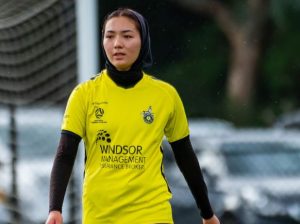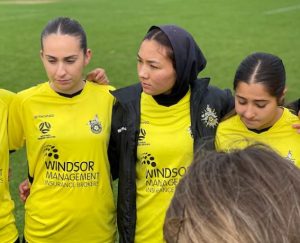Refugee with round ball dreams
Setarah Qasimi is a quietly spoken girl from a humble background who has big dreams.
The Afghan refugee has a passion for soccer and wants to play for the Matildas.
Sam Kerr is her personal heroine and she is looking forward to watching the Women’s World Cup when it comes to Australia next month.
“To represent Australia, that would be my biggest goal,” Setarah says.
“To represent the Matildas, to play Champions League in the same team as Sam Kerr. To become role model for Afghan girls, that would be my dream,” she says.
 Seventeen-year-old Setarah, whose name means ‘star’ in Persian, currently plays for the Heidelberg Warriors Under-19 team but has played for the club’s senior team in the National Premier League, just one step away from the women’s A-League.
Seventeen-year-old Setarah, whose name means ‘star’ in Persian, currently plays for the Heidelberg Warriors Under-19 team but has played for the club’s senior team in the National Premier League, just one step away from the women’s A-League.
But her pathway to a potential football career was a long and tortuous one.
Setarah grew up in Quetta, a city in Pakistan that is home to tens of thousands of exiled Hazaras who fled Afghanistan to avoid persecution as a Shia minority group at the hands of the Taliban.
The Qasimi family fled their homeland in 1995. In Quetta, they managed to rent a humble home with one bedroom for mum Azizah and four children.
Setarah’s father, Abdullah, was in Iran working as a labourer sending back almost all of his meagre wages to his wife and children in Pakistan.
Life in Quetta was precarious for the Qasimis, with Hazaras constantly the targets of terror attacks by militants.
In one such attack, Setarah, her mum and sister Faziea narrowly escaped being killed in a massive blast.
In 2013, things became untenable for the family as bombs were going off regularly in the heart of Quetta’s Hazara Town. Abdullah was stuck in Iran.
He did not know how his four children were faring because it was proving too difficult to see them.
“At that time, I hardly saw my Dad. During my childhood, I think I did not see him for more than six months,” Setarah said.
The Qasimi family never dreamed of a new life in Australia, a country they had barely heard of.
But Abdullah was determined to do something, anything to bring his family to safety.
He managed to get out of Iran and travel through Thailand to get to Indonesia, where he lived for three years under the protection of the United Nations.
During this time, he suffered mental health issues because of his own predicament and the future of his family.
Eventually, Abdullah was told he and his family had been accepted for resettlement in Australia.
The Qasimis were initially settled in Mildura, in Victoria’s north-west. It was here that Setarah first became aware of her talents as a footballer.
She started in language school and then attended Mildura Primary School and Chaffey Secondary College, making friends easily.
“I was scared that I was going to get bullied and made fun of. But when I went it was really welcoming. Everyone was nice, showing me around the school. It was a lot easier than I thought,” she said.
 Setarah and Faziea started playing in the park before joining Mildura United.
Setarah and Faziea started playing in the park before joining Mildura United.
As she progressed in her skills, she also realised she could run very fast.
“I could see that I had natural talent for running. I wasn’t training every day, it was just in me, my speed. And I had a strong foot,” Setarah said.
Her brother Mohammed co-opted in as coach.
“There was no one else to coach us so he was the only option. He did teach us the basics. We knew he didn’t know much so we didn’t expect much,” Setarah said.
Eventually the family moved to Melbourne, buying a house in Cranbourne West.
At 13, Setarah joined the local Barton United FC, a club with many Afghan members. But before long, her coach suggested she take a step up and join an NPL club.
Setarah’s new coach at Heidelberg, Rocco, says she has a promising future.
“She is an attacking player for us. She’s very good one on one, so whenever she’s got space in behind, she’s very good at taking players on and getting past them.
“She creates a lot of opportunities for us. She’s doing really well.”
Setarah says she is excited about what the future might hold.
“I would watch the Matildas, A-League games, but I wouldn’t see anyone like me, with the hijab, who came from a place like me,” she says.
“I wanted to be a representation for girls like me who didn’t have the freedom, the choices that I did. Plus, everyone was telling me how talented I was, so I thought why not make something out of this.
“This is a big opportunity that I have that I wouldn’t have if I wasn’t in Australia,” Setarah says.












